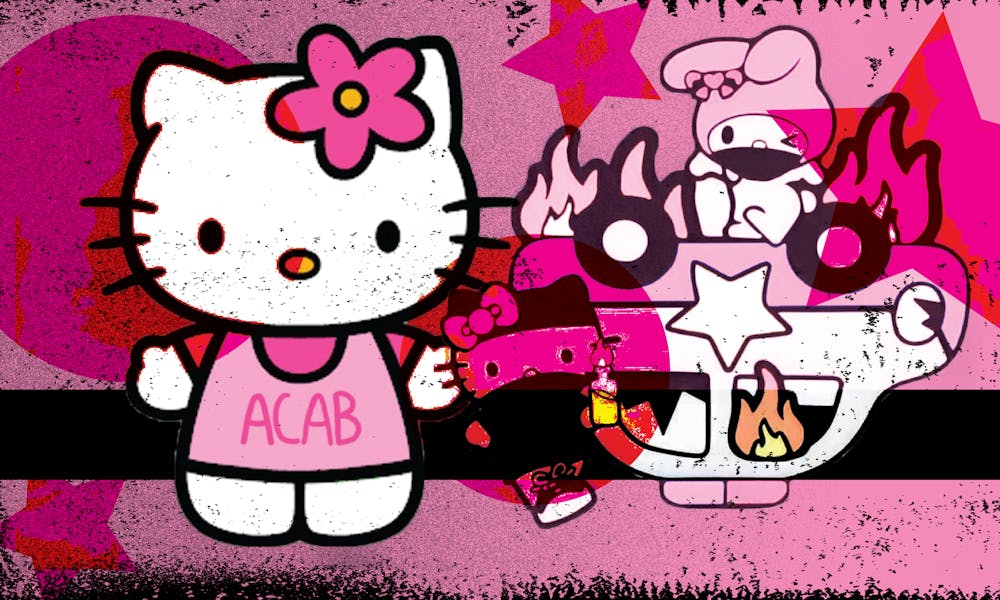The Hello Kitty ACAB and the Hatsune Miku says “All Cops are Bastards!” memes are a new internet cultural symbol present in Twitter profile pics, Instagram feeds, and TikTok audios. Although Hello Kitty ACAB is supposedly a radical critique of the prison industrial complex, these images are instead indicative of the sanitization of violence, performative activism, and the commodification and commercialization of the radical aesthetic. Essentially, “woke” memes and pretty infographics are antithetical to their very purpose.
The concept of the aestheticization of politics originally comes from the prominent Marxist thinker, Walter Benjamin in his iconic essay, "The Work of Art in the Age of Mechanical Reproduction.” He primarily discusses the loss of the "aura" of art that occurs during its mechanical reproductions, but in Benjamin’s epilogue lies his true argument: fascism aestheticizes politics. He contends that fascism permits the proletariat to express their suffering through art—film, photography, painting—and having professed their pain, the system tricks the masses into temporary gratification, which allows the fascist system to continue. Benjamin’s concept of the aestheticization of politics seems like a good fit for the current political moment, so I decided to explore its application to social media and the internet.
In the age of social media and digital activism, aestheticizing politics is the process of framing violence as cute, beautiful, aesthetic, or glamorous in the forms of memes, images, or infographics for the sake of presentation on the internet. This looks like thousands of people reposting 80s groovy font infographics about the Yemen crisis with the broken heart emojis on their Instagram story. It also looks like memes of Sonic exclaiming "Trans Rights!". These memes are readily consumable and appealing because of that juxtaposition: adorable characters with serious declarations! But that appeal is the issue.
Romanticizing horrible crises sanitizes and dilutes the violence these internet cornerstones seek to represent. Rather than observers being confronted by the true terror of police brutality for Black folks in the United States, individuals can distance themselves from that reality to consume violence in a safe, non–threatening way. Not only does this sanitization prevent factual and authentic awareness of the issues they represent, as reality is warped because of their sanitization of violence, but these representations also trivialize real human suffering and death. The issue of violence against trans folk isn’t aided by Sonic memes, but Sonic memes do trivialize the rampant discrimination and violence that trans folk experience every day in the United States.
The sanitized representations of violence via Sonic or Hello Kitty also encourage performative and nonproductive activism. Instead of grappling with the truth of crises across the globe, people can reconcile their desire to do something about human suffering by posting these memes without having to actually do anything. Making or reposting aesthetic images or memes has become a form of activism in and of itself. The issue with this type of virtue signaling is that it provides people with a claim to ethicality. They can say their posts are “helping,” but they do little to nothing to incur legitimate change or persuade people to take action. If anything, posting these types of representations is counterintuitive to increasing productive activism because more and more people will adopt the same belief: it is enough to just post funny or cute memes instead of offering legitimate, helpful resources.
On top of all of that, aestheticizing a “radical” political identity contradicts the true ethos of radical beliefs. For example, people make memes of Sanrio characters proclaiming, “Eat the Rich!” and “All my homies hate capitalism” to demonstrate that they are “woke,” anti–capitalists. However, this process and subsequent aestheticization allow companies to commodify and commercialize those sentiments for profit—think Zumiez’s “Eat the Rich” T–Shirts. Big companies make shirts that say, “Fuck Capitalism!” sell them at three times the cost to make them, with the manufacturing done in sweatshops. Efforts to subvert capitalism literally become subsumed by the capitalist system, which is clearly completely beside the point of those radical movements.
Instead of just making or posting so–called “woke” and “radical” memes, people should seek out alternatives to progress their activist identity, whether that be joining book clubs, volunteering for causes they are passionate about, or equipping themselves with research to share to others in an accessible way. Every person has the capacity to be an activist, and any action taken to bring awareness to others or mitigate forms of suffering is a good thing.







